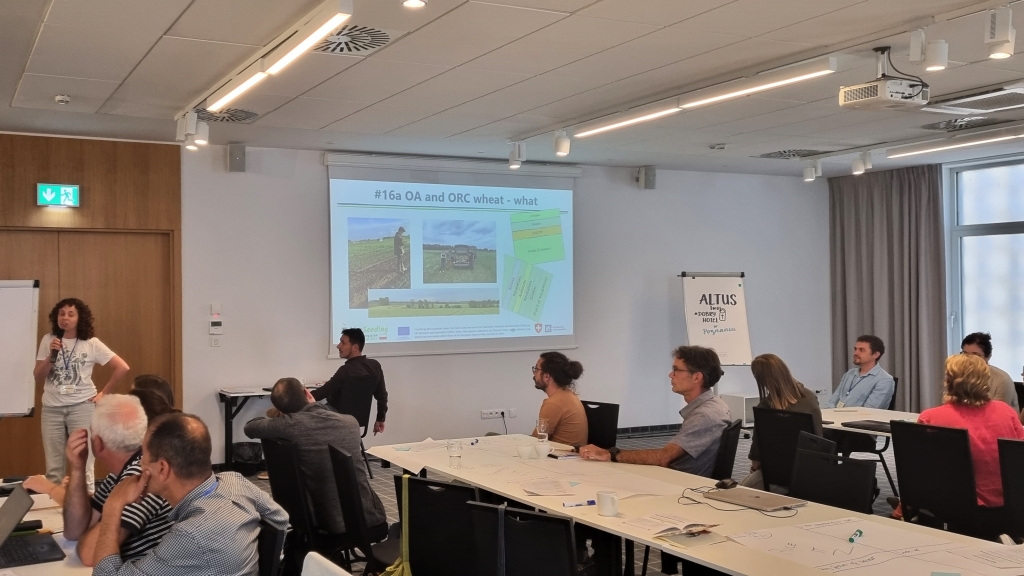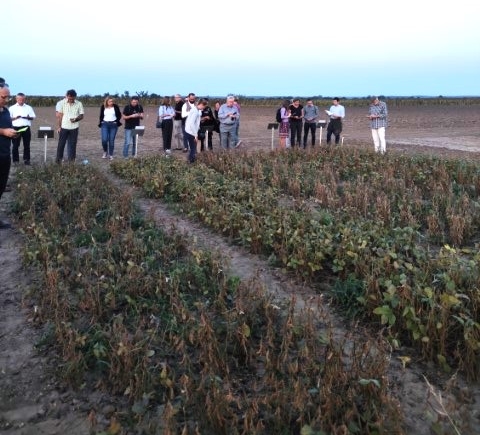One of the challenges in organic agriculture in Europe is the production of organic seed, the availability of varieties bred for organic and the size and scope of organic breeding initiatives. Whilst the use of organic seed is a legislative requirement, the use of derogations for non-organic seed in the organic market is currently commonplace. The European Commission has set the objective to phase this out by 2035. To meet 100% organic seed use in the next 10 years a sixfold increase in production is required. The LiveSeeding project is aiming to make this a reality by bringing partners together from 16 countries in Europe to increase the availability of high-quality organic seed of diverse cultivars adjusted to organic farming for a wide range of crops. This research and development across Europe will support organic seed production and breeding as an integral part of a holistic organic food and farming system.
The second European LiveSeeding annual meeting took place in Poznań, Poland, at the end of September this year. Participants from 37 organisations across Europe came together over 4 days to share their progress and experiences from over the past year on increasing organic seed and plant breeding. As with other ORC projects, LiveSeeding is centred around 17 local ‘Living Labs’ which aim to enhance the availability and adequacy of organic seed for 15 different crops.

The conference started with a reflection of the progress made in the LiveSeeding project in its first year. Some of the key achievements from the first year of the project include coordination of field trials on 31 different crops and a range of cultivar types, including organic heterogeneous material (OHM), varieties (OV) and landraces, a training plan for the course of the project, tools for genetic and phenotypic screening of various crops and traits, development of new OHM and OV and design of web/mobile app tools for cultivar testing and regulatory compliance for genetically diverse seed such as OHM. The Organic Research Centre and Organic Arable are in involved in several areas of the project including advancing organic cultivar testing, horizontal proliferation and scaling-up of organic seed and breeding initiatives, exploring market and society supported organic breeding as well as communication, dissemination, and exploitation.
As part of our work to advance on-farm cultivar evaluation for organic production, we are collaborating with Organic Arable on a ‘LiveCrop Living Lab’ in the UK which covers three key arable crops: Beans, Wheat and Oats. This is building on our historic work exploring on-farm decentralised experimental designs at the field scale, which primarily focussed on wheat

2022/23 was our sixth year of assessing different wheat varieties’ establishment, vigour, weed competitive ability and disease susceptibility as well as post-harvest traits including grain yield and quality in UK organic systems. We are excited by the opportunity to continue to build on this work and explore how the methods and results can be applied to bean production systems. One of the main priorities for the LiveSeeding project is for us to determine how we can create an ongoing low-cost system to ensure that organic farmers have access to robust data on beans, wheat and oat cultivar performance in organic systems in the UK, to optimise field performance and inform future breeding efforts on important traits and trait combinations.
During the LiveSeeding conference experiences from the different Living Labs across Europe were shared, with a variety of scales and running time between them. The type of networks involved is diverse. Experiences range from consultative work for Government agencies, such as the wheat variety testing Living Lab in France to taking a more distributed approach where users test and decide in full autonomy without being dependent on researchers/technicians, as was the case for Sweet Pepper breeding in Spain. The wide array of structures, as well as experimental set ups, highlight that different methods are appropriate for different contexts. Throughout the LiveSeeding project we will continue to learn from different Living Lab’s experiences, and we will draw together the variety testing case studies to determine operational models that can contribute to the long-term sustainability of the Living Lab networks.

During the three days of the LiveSeeding conference there were some important updates on the other work that organisations have been busy with over the past year. LiveSeeding integrates actions across a range of different perspectives. For example, this includes working with the Milan Urban Food Policy Pact (MUFPP). This international agreement amongst 270 cities worldwide aims to support cities wishing to develop more sustainable urban food systems by fostering city to city cooperation and best practices exchange. The MUFPP is a case-study being explored in LiveSeeding to determine methods for “Involving citizens and cities for increasing organic seed production”.
Another session at the conference involved a transversal discussion on the socio-economic aspects of organic plant breeding and seed production. Participants identified issues in their own areas of work and then shared these with experts focussed on other disciplines to identify solutions. This collaborative approach with participants from many different backgrounds and experiences lead to a wide array of solutions that can be taken forward in next year’s work.
On the last day of the conference several field visits were arranged by the Polish partners. The first stop was at Poznan Plant Breeding where there was a tour of the modern seed treatment and packaging line. This was followed by a presentation at Jargol Farm in Pierzchno on the regenerative practices that were implementing at a large commercial scale. The group then visited the Researcher Centre for Cultivar Testing (COBORU), information on the main activities of COBORU were introduced including the on-station organic ecological variety testing and the development of participatory on-farm cultivar trials for the organic sector. It was great to hear the Polish authority’s dedication to the organic sector. A visit to COBORU’s experimental station was followed by a field evaluation on soya bean varieties using SeedLinked, the European interactive platform for cultivar evaluation which is being tested within the project. The SeedLinked platform is being explored as a low-cost, highly inclusive and representative method for organic on-farm cultivar evaluation. The platform is now available in 8 languages and in 16 European countries, including the UK and Ireland.

Charlotte and Isi thank their Polish hosts, as well as the LiveSeeding coordinating team, for a productive meeting in Poznań. It was full of informative discussions and experience sharing with a schedule packed with 23 sessions of presentations and interactive workshops, which we have only scratched the surface of here. It was great to re-connect with our partners in Europe and build momentum for the next three years of collaboration!
Isabel Mackintosh and Charlotte Bickler
